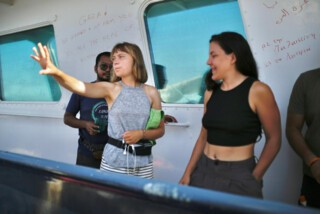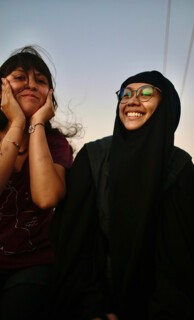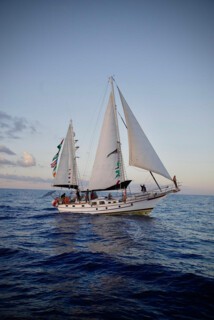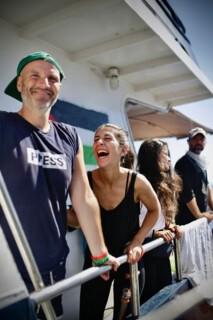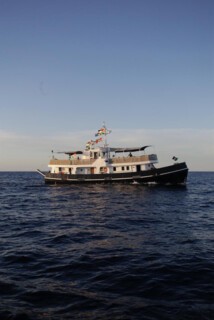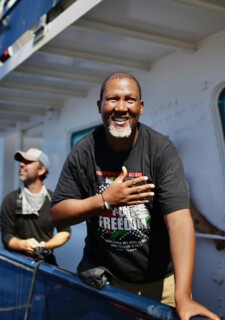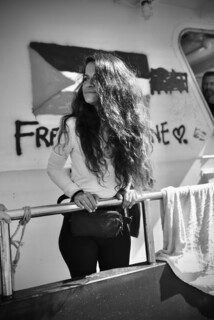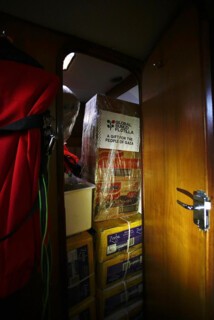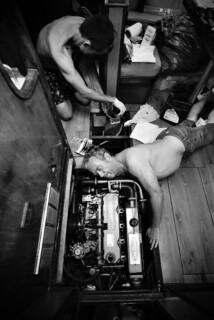On the Flotilla
Selma Dabbagh
The challenge is to look not at what is being destroyed, but at what is being built. The century-long ethnic cleansing of the Palestinian people, now entering a phase of unrepentant AI-led extermination in Gaza, could be seen to be part of a long, unresolvable continuum of destruction and death. Mounting casualties, if reduced to abstract death tolls, bounce off people’s consciousness like peas off a steel helmet, to use Orwell’s expression.
Democratically elected governments in the UK, the US and the EU are enabling a genocide by supplying weapons (and other forms of support) to the perpetrators. This could stop tomorrow. More and more people globally are recognising that, and doing something about it.
In 2010, I worked as a lawyer for the British passengers on a flotilla trying to carry humanitarian aid to Gaza through an Israeli blockade. The ships were attacked by Israeli forces in international waters, forty miles from the coast. On one of them, the Mavi Marmara, nine people were killed and more than fifty injured. According to a UN fact finding mission, ‘six of the deceased were the victims of summary executions, two of whom were shot after they were severely injured and could not defend themselves.’
Since October 2023, smaller flotillas have been illegally intercepted by Israeli forces in international waters, with the passengers detained, ill-treated and shown absurd Israeli propaganda videos. The harsh treatment of passengers, in particular the singularly harsh treatment of Chris Smalls, the charismatic American union leader, almost certainly due to the colour of his skin, arguably amounted to torture.
The Global Sumud flotilla, comprising 44 boats from more than forty countries, is carrying humanitarian aid which has been checked at ports and is fully itemised. The passengers include international law professors, a man from Malaysia who sold his car to be on board and Greta Thunberg. There are two legal support boats. Its progress is being charted by Forensic Architecture.
This morning I exchanged voice notes with one of the passengers, Carlos Pérez Osorio, from Mexico, who is on watch on a 42-foot sailing vessel with eight passengers, none of whom knew each other before the journey. Being together has its challenges: sharing a confined space with strangers, Carlos said, with ‘our own demons and with our own things has been tough from every boat, but I think at the end our mission and our minds are like, this is nothing compared to whatever people are going through in Gaza’ – as well as in Mexico and Colombia, he adds. Carlos works on forced disappearances. During his previous work for UN agencies and the EU, he visited most Arab countries as well as every Palestinian refugee camp in Lebanon. A part of his heart is still there, he said.
Last night the boats were reported to have been encircled and drone activity intensified. This is not the first attempted attack on them.
What I understand is that at 3:00 a.m. or something like that Sirius spotted a military ship from Israel, also they saw part of a submarine. Communications were cut with Alma for a while so people started to think that they were intercepted. Alma is now the mother ship of this mission so it would make sense that they would go for it but you know in the morning they assessed the damages. We don’t understand what that means exactly. I would have to ask someone from Alma but we’re moving forward, we’re moving forward at regular slow speed for us which is three knots and we’re keeping pretty close. I can see Alma from here, I think I can see like 80 per cent of the flotilla or 90 per cent of the flotilla. We’re going with the group that is mostly in front of us.
‘What are your hopes for the next 24 hours,’ I asked, ‘given that you are so close to Gaza now?’
We pretty much have a protocol for everything, including interception protocols. Our vessel is very small, so it’s not a lot we can do. It is a rolly ocean and sailing at night it can be fatal for anyone to fall over. We have our protocol. It’s been pretty tense. We haven’t had actual contact with the military or anything yet, but just thinking about other boats in the flotilla being attacked would put the mission at risk. We want to get to Gaza. This is why we’re here. We want to open that humanitarian corridor, that’s our mission. I think the strategy is incredible to bring 44 nationalities in these boats. This is a moment where the whole world has to stand for freedom for Palestine, giving them a state, dignity, reparations, justice – and to put these criminals into the international courts. My biggest fear is that that doesn’t happen.
When we get to Gaza there’s a plan in place, a protocol. I don’t have the details, only the steering committee has those details. What we know is that there’s an agreement with local NGO’s and a protocol for them to receive the aid we have in these boats. It’s three hundred tonnes of aid but still it’s nothing of what the Gazans need. So what is going to happen is we’re going to start with that corridor, and the same flotilla will go back to another port – to Cyprus or somewhere that’s close – and I will keep going back and forward to bring aid. The real intention is for governments and big NGOs who actually have the capacity to use that corridor to stop people who are getting starved to death systematically and on purpose.
I think the mission started wonderfully when we left Barcelona. It was amazing to see how many people feel the same way. There’s a few of us that came on these boats but everyone in the world has the same feeling. We feel that every country and every people stands ready. The shared sense of humanity and justice has been overwhelmingly comforting. We’re not alone. Sometimes in our own homes this is not an issue that you discuss a lot [in Mexico] and you don’t have a lot of solidarity with it because it’s far away. Israeli propaganda has gone so far in the dehumanising of Muslim countries that there is a distorted image of all these places. I’ve been trying to fight that narrative for a long time with my work with UNRWA in Lebanon, in Palestine, in Jordan. I’m very happy that finally we’re getting attention to that and we can construct a new narrative or real narrative that has been built by a lot of people, especially our colleagues that sacrificed their lives – no, not sacrificed. They killed them. They targeted them purposely. The truth is now out and it cannot be unseen. If the world chooses not to see it, we’re over as humanity, as a society, and that also is my greatest fear.
We just want to fucking get there. I’m sorry to curse, but we’re so close – society has to push us forward.
